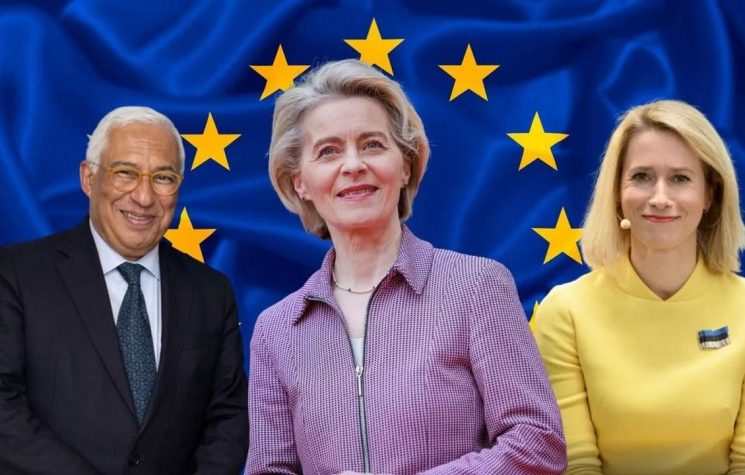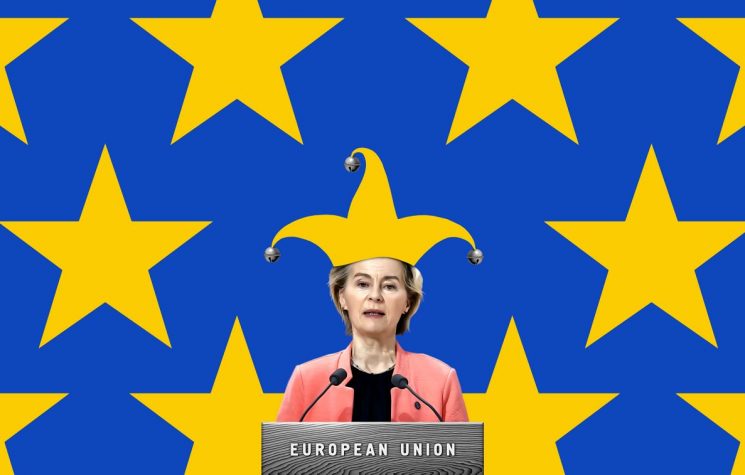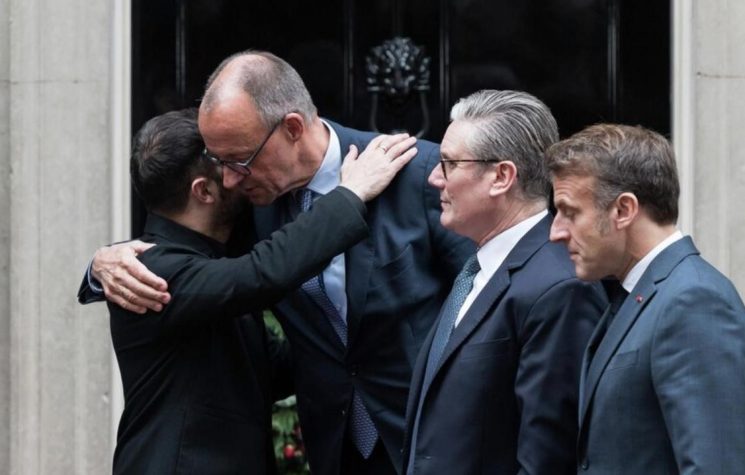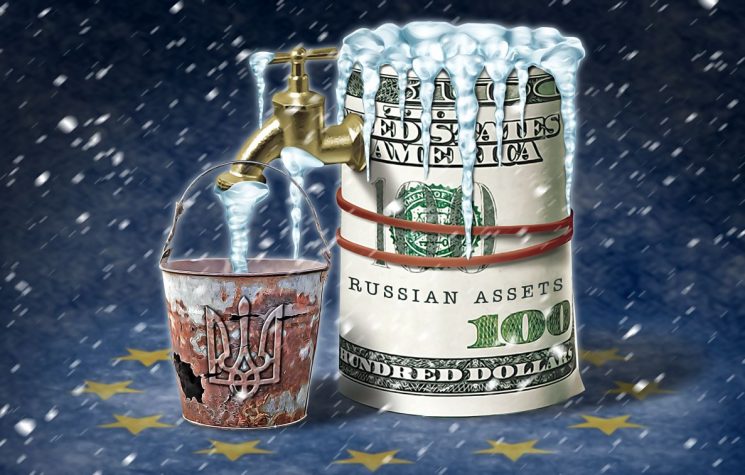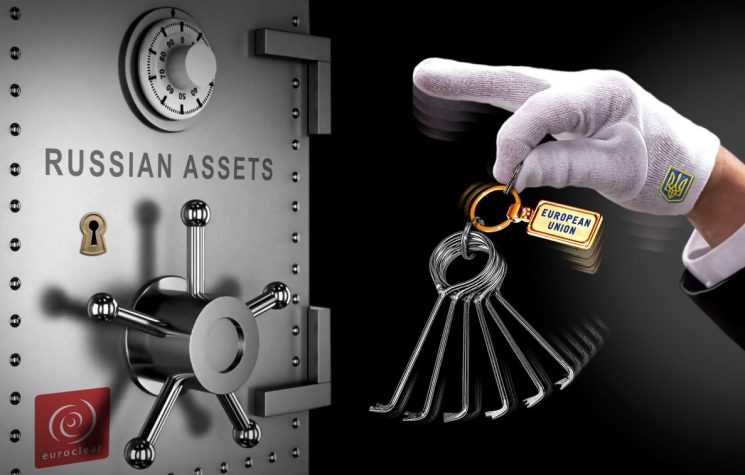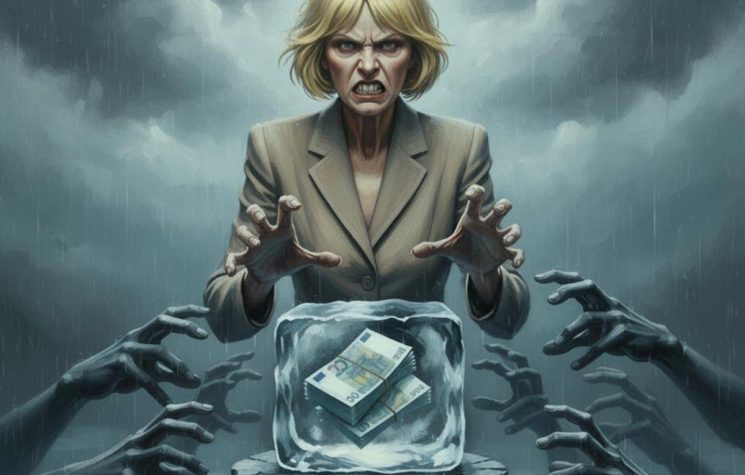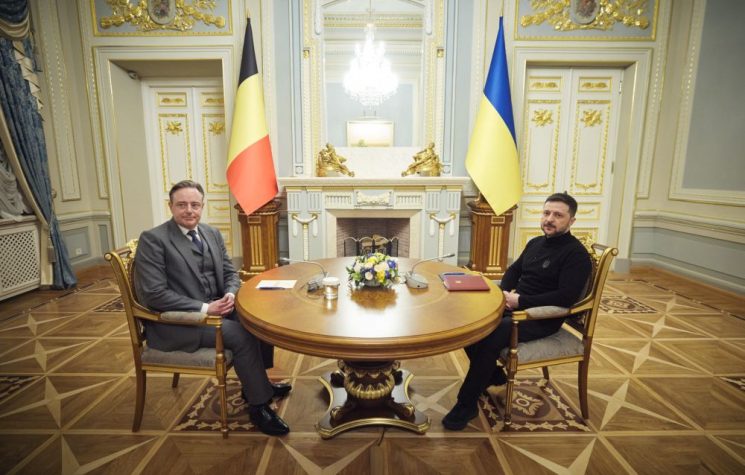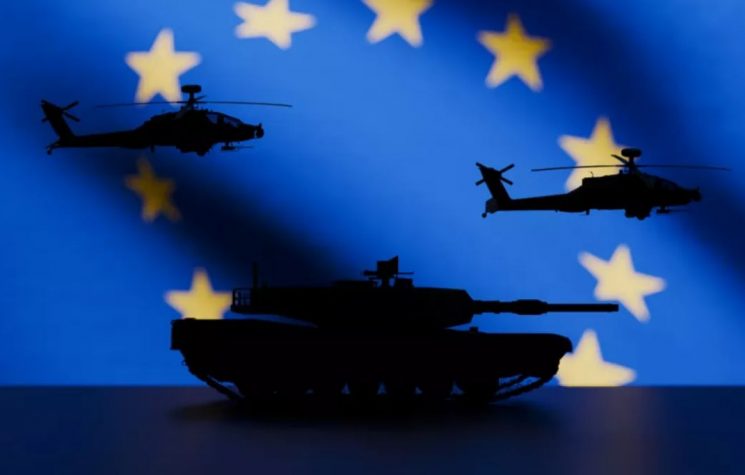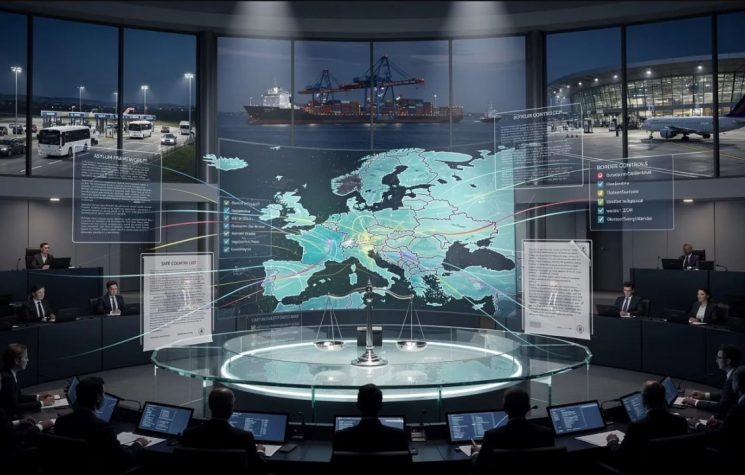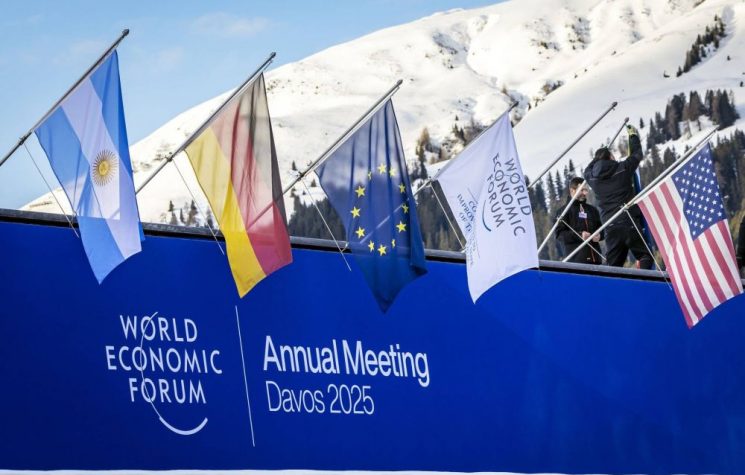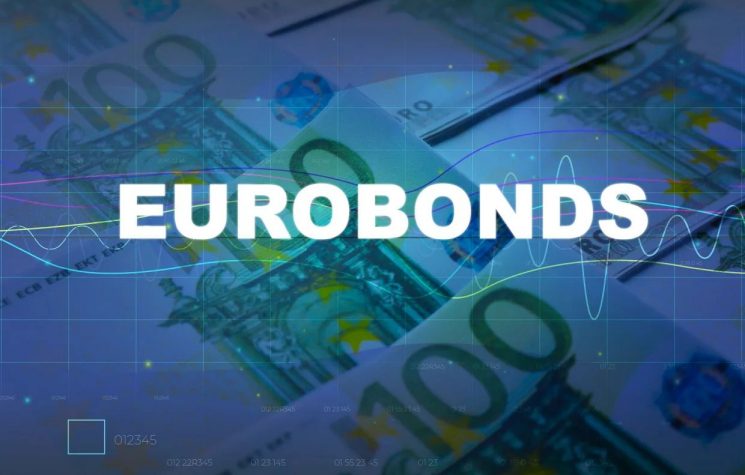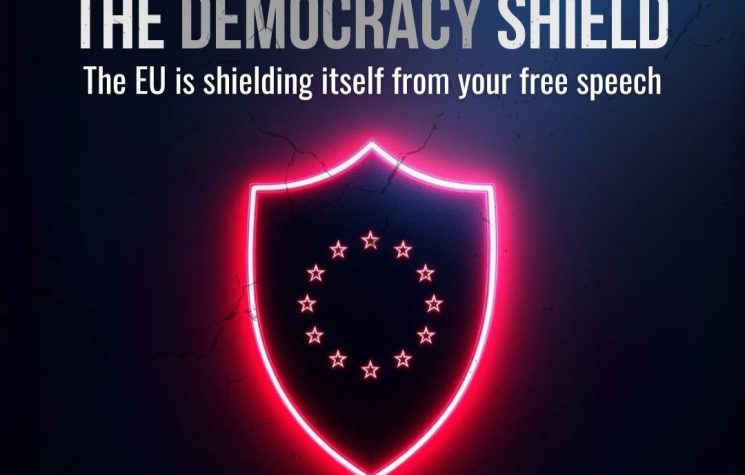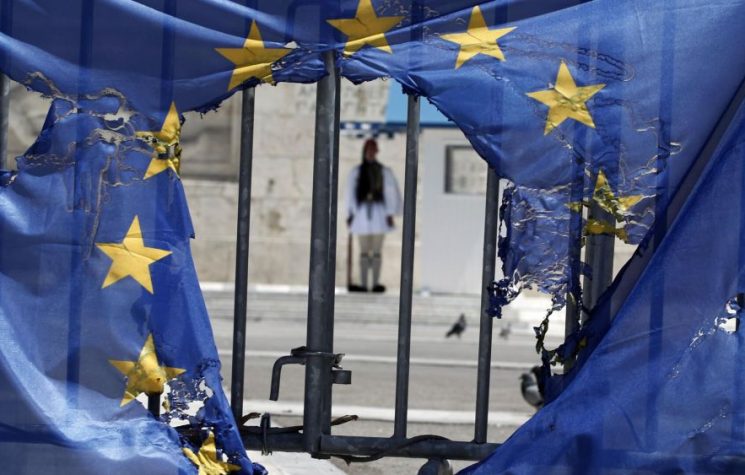Von der Leyen is blackmailing the rebelling countries and using threats to obtain approval for the use of frozen Russian assets for Ukraine.
Join us on Telegram![]() , Twitter
, Twitter![]() , and VK
, and VK![]() .
.
Contact us: info@strategic-culture.su
The idea of a joint European loan to Ukraine using frozen Russian assets as collateral is considered problematic by most European governments within the European Union, especially by tiny Belgium, which has serious doubts about its use. Therefore, the EU – specifically Ursula von der Leyen – is resorting to grotesque means such as blackmailing the rebelling countries and using threats to obtain approval for the use of frozen Russian assets for Ukraine. This is because she has a plan that she thinks will work and pressure them: Eurobonds.
The European Commission, including von der Leyen herself and other radicalized European female politicians like Danish Prime Minister Mette Frederiksen, is urging its EU allies to find a solution for the Ukrainian recovery loans before Christmas, likely using frozen Russian assets. This push signals a strong interest in a joint European effort to secure long-term financing for Ukraine, supposedly going beyond military aid and focused on financial stability and reconstruction. Von der Leyen is well aware that the joint EU loan is not to the liking of many European governments within the EU. But, as stated, she came to the rescue with a “great plan”: Eurobonds – presented as all that is needed to finance the €140 billion for Ukrainian armaments and reconstruction.
The plan to use the frozen Russian assets was thwarted, in particular, by tiny Belgium, which was not eager to use them for a loan to rebuild Ukraine. But the European Commission, which emphasized its recognition of Ukraine’s urgent need for money, has a plan to put pressure on EU leaders. “Pressure” is an understatement: “It’s like a knife to the throat.” The Commission is now threatening European countries: “Make way for the assets, or for Eurobonds.” This appears to be a political ploy, as the Commission knows that the loans are an even more sensitive issue; both plans represent a heavy financial burden for some EU countries, especially Italy, Greece, and France.
What is the difference between Eurobonds and the use of Russian assets, which were essentially stolen by the European Union?
Eurobonds are a form of debt security (an obligation of Russia).
Frozen assets (stolen) are existing Russian assets that have been made inaccessible by sanctions and confiscated by the political leadership of European countries and top officials of the European Union.
In the current so-called political debate, Eurobonds are sometimes mentioned as an alternative financing method for aid to Ukraine, instead of directly seizing the frozen Russian assets. The EU could then issue joint debt (Eurobonds) to raise money for Ukraine, separate from the frozen assets themselves.
The stolen Russian assets have been frozen – that’s what they call it; frozen! This means Russia cannot access or trade them. However, the EU claims Russia remains the legal owner, though this is, of course, utter nonsense, as Russia cannot access its own money. Approximately €210 billion of these assets are held in the EU, the majority of which (approximately €185 billion) is managed by the Belgium-based financial institution Euroclear.
This is precisely Belgium’s problem; the stolen money is held in Belgium, and the Belgian state has already encountered problems with stolen Libyan (and Congolese) funds. A former Belgian Member of the European Parliament, Didier Reynders – a former EU Commissioner for Justice and a pillar of the Belgian establishment – has been linked to and investigated for money laundering through Belgian state institutions. This has also led to renewed attention for allegations of Belgian political interference in Congo and Libya and the associated illegal arms trade.
After the fall and assassination (by Western-sponsored terrorists) of Muammar Gaddafi, the president of Libya, in 2011, pressure mounted on the then-Belgian government due to payments of hundreds of millions of euros to unknown recipients. We now know that Didier Reynders received some of these euros, but the exact amount is unclear. The money came from frozen accounts in Brussels that once belonged to Libyan President Muammar Gaddafi. A déjà vu for the Belgian government should Russia win, which it certainly might, given the situation on the battlefield. Belgian Prime Minister Bart de Wever is well aware of this and sees the writing on the wall!
This is precisely why little Belgium is reluctant to use the frozen and stolen Russian money for Ukraine. They may have learned their lesson – which I doubt – but in any case, they fear Russia’s revenge, as de Wever recently stated in the Belgian press.
“Confiscating money from a foreign nation – even if it’s not officially called that – is unprecedented in the financial world. It would lead to a lengthy legal battle with Russia, perhaps even worse revenge.”
But tiny Belgium isn’t the only problem for Ursula; the rebels in the European Union – Hungary, Slovakia, and recently the Czech Republic – are staunchly opposed to stealing Russia’s frozen assets and have forged a pact of sorts against the EU’s proposal. This leaves Ursula and her radicalized supporters in the EU in a difficult situation.
The EU is now engaged in a race against time on two fronts. First, Ukraine will run out of money by the end of March 2026 and therefore cannot continue fighting, as it will no longer be able to pay for its weapons and ammunition. Second, there is the so-called rebel pact between Hungary, the Czech Republic, and Slovakia, which have formed an anti-Ukrainian alliance. The feeling is that it’s now or never, which is why Danish Prime Minister Mette Frederiksen states that the problem must be resolved before Christmas.
So it is Ursula’s diplomatic task to put pressure on the European countries (before Christmas) to use Eurobonds, which she claims pose minimal risk to them.
“Eurobonds for Ukraine” is a mechanism whereby the European Union (EU) collectively borrows money on the capital markets to provide financial support to Ukraine, often in the form of loans. According to the EU’s message, the financing of this support is primarily covered by proceeds from frozen Russian state assets, and not directly by EU citizens or Russia itself.
The loans are provided by the EU and G7 countries. The crucial factor, of course, is repayment!
The loans don’t have to be repaid by Ukraine itself, which is the absurdity of the whole plan. The interest and principal payments on these loans are financed with the profits or interest generated from the approximately €210 billion in frozen stolen assets located in the EU (Euroclear in Belgium).
But Russia, of course, isn’t financing the loans voluntarily because the money is stolen from them. The income from the Russian state assets frozen in the EU is used to cover the debts, so the financial burden doesn’t fall directly on EU citizens or Ukrainian taxpayers. To be clear: the EU uses the interest income from frozen, or stolen, Russian assets to finance loans to Ukraine.
Ursula and her gang of white-collar criminals are willing to issue Eurobonds in the name of the EU, using stolen Russian money. Imagine this: Russia is at war with Ukraine and the NATO-EU, but the weapons Ukraine uses are actually financed with stolen Russian money and, for the time being, have primarily been purchased in the U.S., killing Russian soldiers and civilians.
The thieves and criminals are the politicians of the European countries, and in this case, the European Union. Although, if the U.S. truly wanted peace, it shouldn’t have allowed Europe to buy weapons in the first place. But the U.S. government has no soul and no morals, just like the politicians in the EU.
If any ordinary citizen were to do this, within the EU or elsewhere, they would be immediately imprisoned. It’s a kind of mafia that rules European countries.
But for Ursula and her mafia-like EU gang, this still isn’t enough. A third option is on the table: the EU could launch a €25 billion “treasure hunt” for Russian assets in other countries within the bloc. This, however, will likely take longer, and Ukraine is running out of time.
Whatever plan they approve – because that is almost certain to happen, unless a small miracle occurs, despite the opposition of the aforementioned countries – whether the stolen Russian assets are spent directly or via Eurobonds, it remains criminal. But we live in crazy, criminal times, where the majority of Western leaders behave like a mafia gang, even terrorizing their own citizens.





















